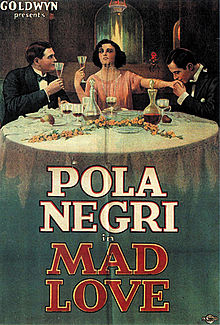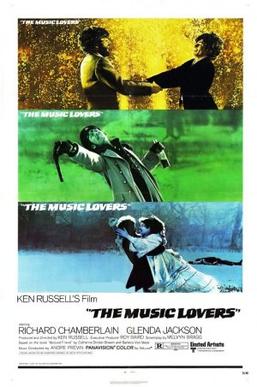
The Music Lovers is a 1971 British drama film directed by Ken Russell and starring Richard Chamberlain and Glenda Jackson. The screenplay by Melvyn Bragg, based on Beloved Friend, a collection of personal correspondence edited by Catherine Drinker Bowen and Barbara von Meck, focuses on the life and career of 19th-century Russian composer Pyotr Ilyich Tchaikovsky. It was one of the director's biographical films about classical composers, which include Elgar (1962), Delius: Song of Summer (1968), Mahler (1974) and Lisztomania (1975), made from an often idiosyncratic standpoint.

Pola Negri was a Polish stage and film actress and singer. She achieved worldwide fame during the silent and golden eras of Hollywood and European film for her tragedienne and femme fatale roles and was acknowledged as a sex symbol.

Kyon Ki (transl. Because) is a 2005 Indian romantic drama film written and directed by Priyadarshan and produced by Sunil Manchanda and Mukesh Talreja, with Orion Pictures serving as distributor. The film is a remake of Priyadarshan's own 1986 Malayalam film Thalavattam which in turn was inspired by the 1975 movie One Flew Over the Cuckoo's Nest which was adapted from Ken Kesey's 1962 novel of the same name. The film stars Salman Khan, Jackie Shroff, Kareena Kapoor, Suniel Shetty, Rimi Sen and Om Puri in pivotal roles, and tells the story of Anand, a mental patient whose past draws a female doctor, Tanvi, close to him, testing her own beliefs and challenging her authoritarian father, the administrator of the sanatorium in which Anand has been admitted.

Ripper is a 2001 slasher film, directed by John Eyres, and starring A. J. Cook and Bruce Payne. It was written and produced by John A. Curtis and Evan Tylor and by production companies Prophecy Entertainment and Studio Eight Productions.
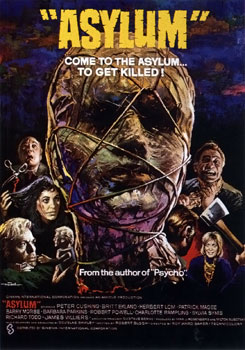
Asylum is a 1972 British anthology horror film made by Amicus Productions. The film was directed by Roy Ward Baker and produced by Milton Subotsky. Robert Bloch wrote the script, adapting four of his own short stories.

Ten Days in a Mad-House is a book by American journalist Nellie Bly. It was initially published as a series of articles for the New York World. Bly later compiled the articles into a book, being published by Ian L. Munro in New York City in 1887.
The Alleged Lunatics' Friend Society was an advocacy group started by former asylum patients and their supporters in 19th-century Britain. The Society campaigned for greater protection against wrongful confinement or cruel and improper treatment, and for reform of the lunacy laws. The Society is recognised today as a pioneer of the psychiatric survivors movement.

A Woman of the World is a 1925 American silent comedy-drama film starring Pola Negri, directed by Mal St. Clair, produced by Famous Players-Lasky, and distributed by Paramount Pictures.
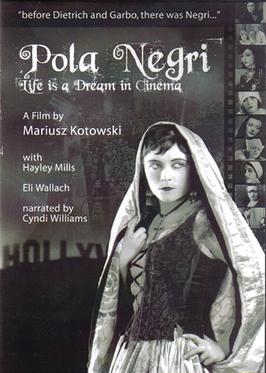
Pola Negri: Life is a Dream in Cinema is a feature-length biographical documentary film by Polish-American director Mariusz Kotowski released in 2006. The film chronicles the life of Polish silent film actress Pola Negri, as told by those who knew her and those who have studied her life and films.

Mariusz Kotowski is a Polish-born writer and director. As a director, he has gained a reputation for cinematic portrayals that are atypical of both Hollywood and independent film styles and that cleverly mix different film approaches into a cohesive whole.

Dimitri Buchowetzki (1885–1932) born Dmitry Savelyevych Bukhovecky was a Russian film director, screenwriter, and actor in Germany, Sweden, United States, United Kingdom, and France.

Lily of the Dust is a 1924 American silent drama film directed by Dimitri Buchowetzki, starring Pola Negri, produced by Famous Players-Lasky, and distributed by Paramount Pictures. This movie was based on the 1908 novel The Song of Songs by Hermann Sudermann and the 1914 Broadway play The Song of Songs by Edward Sheldon.
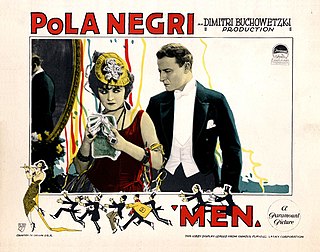
Men is a 1924 American silent drama film directed by Dimitri Buchowetzki and starring Pola Negri that was produced by Famous Players-Lasky and distributed by Paramount Pictures.
Bright Shining City Productions is an independent film and media production company established in Austin, Texas by Polish-American film director and producer Mariusz Kotowski in 2005. The company's initial film project was the full-length documentary Pola Negri: Life is a Dream in Cinema, highlighting the career of Polish silent film star Pola Negri. The production company went on to release the narrative films Forgiveness and Deeper and Deeper (2010), the latter starring Emmy-winning actor David Lago. All three of the films have also been released on DVD.

Trick or Treats is a 1982 American slasher dark comedy film directed by Gary Graver and starring Jacqueline Giroux, Peter Jason, Chris Graver, David Carradine, Carrie Snodgress, and Steve Railsback.
Bestia is a 1917 Polish silent film starring Pola Negri. It was directed by Aleksander Hertz and released by Warsaw-based film studio Sphinx Company. It was released in the U.S. under the title The Polish Dancer in 1921.
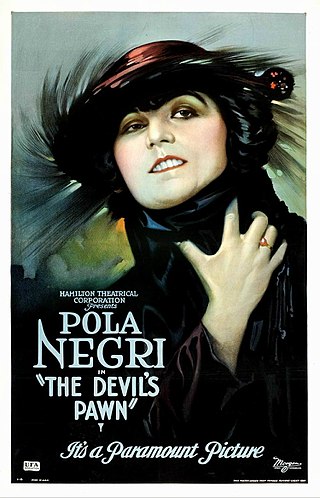
Der Gelbe Schein is a 1918 German silent film starring Pola Negri in a double role as Lea and her mother Lydia, Victor Janson as Ossip Storki, and Harry Liedtke as Dimitri. It was directed by Victor Janson and Eugen Illés.

Die Augen der Mumie Ma is a 1918 German silent film directed by Ernst Lubitsch. The film stars Pola Negri as Ma, Emil Jannings as Radu, and Harry Liedtke as Wendland. It was the first collaboration between Lubitsch and Negri, a pairing that would go on to make worldwide successes such as Carmen (1918), Madame DuBarry (1919), and Sumurun (1920).

Carmen is a 1918 German silent drama film directed by Ernst Lubitsch and starring Pola Negri, Harry Liedtke, and Leopold von Ledebur. It was based on the novella Carmen by Prosper Mérimée. Like Bizet's opera Carmen, this film only adapts the third part of Mérimée's novella and transforms the character of Don José at the beginning of the story from bandit on the run to honest man in love with his childhood sweetheart. The film was released with English intertitles in the United States in 1921 under the alternative title Gypsy Blood.

The Flame is a 1923 German silent drama film directed by Ernst Lubitsch and starring Pola Negri, Hermann Thimig, and Alfred Abel. The film is based on a play by Hans Müller. In the United States it was released under the alternative title Montmartre. It was the last film Lubitsch made in Germany before emigrating to Hollywood where he directed his first American film Rosita for United Artists the same year.
